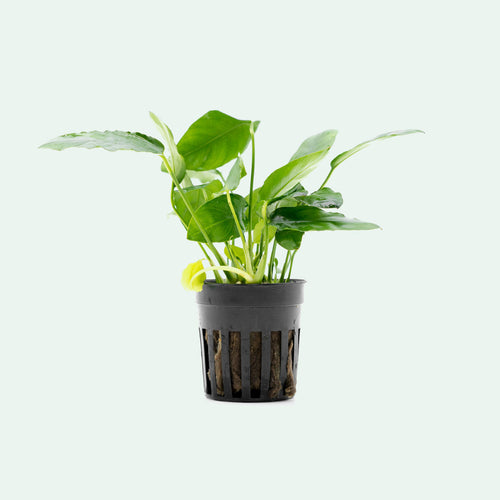

Anubias Paxing
- $8.99
- $8.99
Tissue culture plants are cultivated in sterile lab settings ensuring your plant is free from pests, snails and algae! These are young specimen that are grown in emersed forms. Gel should always be removed prior to planting.
LIVE PLANTS ARE SUSCEPTIBLE TO STRESS AND DAMAGE FROM TRANSIT - This may appear in the form of minimal melt, leaf loss, cosmetic damage, etc. Refunds or replacements will not be issued for plants with viable root systems or that die out of our care.
Anubias plants are hardy and beginner-aquarist friendly!
Remove this plant from its growing medium before planting.
Click here to shop all aquarium plants!
Anubias is a popular genus in the planted aquarium hobby. This family of smaller aroids have a bulletproof reputation in the planted tank community for being extremely hardy, adaptable and tolerant of many aquarium conditions. Their classic look and minimal care requirements make them a favorite amongst seasoned aquarists and beginner hobbyists alike.
Anubias are epiphytic and grow well when attached to porous hardscape such as aquarium driftwoods and stones. Because of this, these aquatic plants are perfect for filling in bare areas of an aquascape or wherever additional greenery is desired. It should be noted that Anubias are slow growers, so an established aquarium is ideal, if possible, as they can be more susceptible to algae growth on their leaves when compared to other aquarium plants. Despite the hardy reputation, Anubias plants will appreciate a well-maintained environment with clean water, CO2 injection and low to medium lighting. Care should be taken to ensure the rhizome is not buried as this will cause damage to the plant. When ready for propagation, gently split the rhizome and reattach elsewhere. If being planted for an emersed setup, sufficient moisture should be provided to ensure the plant does not dry out.
| Common Name | Anubias Paxing Anubias Paxing Compact |
| Care | Easy |
| Lighting | Low |
| CO2 | Optional |
| Suggested Placement | Attach to wood or stone |
| Propagation | Separate rhizome |
| Growth Rate | Slow |
| Leaf Size | Varies |
-
Share -
Tweet -
Pin it
